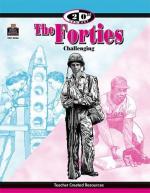|
This section contains 1,205 words (approx. 5 pages at 300 words per page) |

|
In 1945 there were more than three hundred thousand illiterate soldiers, called "jugheads" by their fellow soldiers, serving in the army. This situation changed quickly because, as the army boasted, it could teach draftees how to read and write in eight weeks using a combination of movies, flash cards, and a technique of word recognition rather than phonetic reading. Education experts attributed the army's success with the pro gram to two factors: pupils could be forced to study at any time during a twenty-four-hour period, and soldiers wanted to be able to write letters home.
Unskilled and Delinquent.
The disorganization of American high schools reached a crisis level during World War II. The Naval Officers' Training Corps found that 62 percent of its candidates failed fundamental arithmetic reasoning tests and that only 23 percent had more than one and a half years of math in high school. The...
|
This section contains 1,205 words (approx. 5 pages at 300 words per page) |

|




